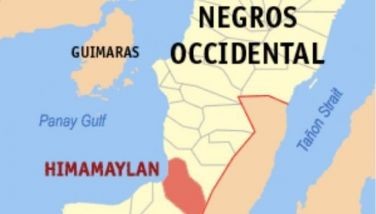NFA up for major restructuring
July 2, 2005 | 12:00am
The National Food Authority (NFA) is up for a major restructuring to ease the weight of its impact on the government’s consolidated public sector deficit, government officials said yesterday.
Finance Secretary Cesar V. Purisima said NFA contributed P27 billion to the 2004 consolidated debt and the government loses an average of P2 billion a year in subsidies.
"This is too much for a trading company," Purisima said. "We need to instill discipline on government owned and controlled corporations (GOCCs). NFA itself needs restructuring."
According to Budget Secretary Emilia Boncodin, NFA has long been a concern among budget planners but the executive decision has yet to be made on how to rationalize the functions of the NFA.
NFA primarily operates as a trading company that implements the government’s rice support program by buying palay from the farmgate and selling rice in strategic areas to smoothen the volatility in the prices.
"It’s really intended to support the price of palay and rice but we have not been able to afford the amount necessary to actually accomplish this," Boncodin said.
According to Boncodin, there were several legislative measures now pending in Congress all designed to ensure that NFA would no longer be a burden on the national budget.
"I personally recognize that some form of subsidy is necessary but it can no longer be the kind of subsidy being implemented now," Boncodin said. "At the very least, the process has to be totally transparent, it can not just go through credit lines the way it is done now."
Purisima, on the other hand, said the Department of Finance (DOF) should ultimately gain control on the budget planning of GOCCs if only to allow budget managers to tighten their control on the losses of these corporations.
"I want to be able to have a say on how their finances are going to be run," Purisima said. "The NG ultimately has to bear the burden of their accumulated deficit and it can no longer go on that way."
Earlier, the International Monetary Fund (IMF) said the NFA and other GOCCs should be prevented from shifting the burden of fiscal adjustment to the National Government.
After the efforts to unburden the National Power Corp (Napocor), the IMF said the National Government should avoid taking on more fiscal burden from other government corporations.
IMF mission head Masahiko Takeda said the government could be blind-sided by other parts of the public sector that could cause future problems if not closely monitored.
According to Takeda, GOCCs should be watched closely to avoid shifting the burden of fiscal adjustments disproportionately onto the National Government.
Takeda said that steps have been taken to arrest the financial hemorrhage of the Napocor but said the bigger question now was how to keep the deficit from worsening all over again.
Finance Secretary Cesar V. Purisima said NFA contributed P27 billion to the 2004 consolidated debt and the government loses an average of P2 billion a year in subsidies.
"This is too much for a trading company," Purisima said. "We need to instill discipline on government owned and controlled corporations (GOCCs). NFA itself needs restructuring."
According to Budget Secretary Emilia Boncodin, NFA has long been a concern among budget planners but the executive decision has yet to be made on how to rationalize the functions of the NFA.
NFA primarily operates as a trading company that implements the government’s rice support program by buying palay from the farmgate and selling rice in strategic areas to smoothen the volatility in the prices.
"It’s really intended to support the price of palay and rice but we have not been able to afford the amount necessary to actually accomplish this," Boncodin said.
According to Boncodin, there were several legislative measures now pending in Congress all designed to ensure that NFA would no longer be a burden on the national budget.
"I personally recognize that some form of subsidy is necessary but it can no longer be the kind of subsidy being implemented now," Boncodin said. "At the very least, the process has to be totally transparent, it can not just go through credit lines the way it is done now."
Purisima, on the other hand, said the Department of Finance (DOF) should ultimately gain control on the budget planning of GOCCs if only to allow budget managers to tighten their control on the losses of these corporations.
"I want to be able to have a say on how their finances are going to be run," Purisima said. "The NG ultimately has to bear the burden of their accumulated deficit and it can no longer go on that way."
Earlier, the International Monetary Fund (IMF) said the NFA and other GOCCs should be prevented from shifting the burden of fiscal adjustment to the National Government.
After the efforts to unburden the National Power Corp (Napocor), the IMF said the National Government should avoid taking on more fiscal burden from other government corporations.
IMF mission head Masahiko Takeda said the government could be blind-sided by other parts of the public sector that could cause future problems if not closely monitored.
According to Takeda, GOCCs should be watched closely to avoid shifting the burden of fiscal adjustments disproportionately onto the National Government.
Takeda said that steps have been taken to arrest the financial hemorrhage of the Napocor but said the bigger question now was how to keep the deficit from worsening all over again.
BrandSpace Articles
<
>
- Latest
- Trending
Trending
Latest
Trending
Latest
Recommended





























